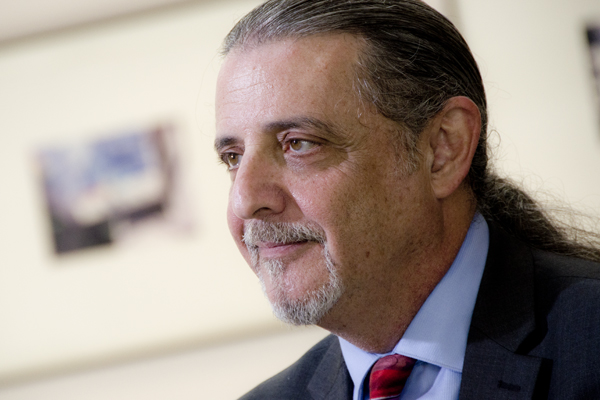USF Health’s Jay Wolfson, DrPH, JD, was in high demand by local media following this morning’s landmark Supreme Court ruling upholding the federal health care law.
“Extraordinary,” Dr. Wolfson said, commenting on the 5-4 decision that found the Affordable Care Act’s “individual mandate” constitutional as a tax. “Most of the law was upheld in large part because Chief Justice John Roberts joined the majority in deeming the mandate (valid as) a tax under the Constitution.”
The individual mandate, set to take effect in 2014, requires that virtually all Americans have health insurance or pay a penalty.

USF Health’s Jay Wolfson, DrPH, JD, is interviewed by a WUSF reporter.
“The Affordable care act’s requirement that certain individuals pay a financial penalty for not obtaining health insurance may be reasonably characterized as a tax. Because the Constitution permits such a tax, it is not our role to forbid it, or to pass upon its wisdom or fairness.” Chief Justice Roberts wrote.
The ruling allows the government to continue implementing the law, including the provision calling for states to expand Medicaid to cover millions more Americans — those with incomes up to 133 percent of the poverty line. However, while upholding the law virtually in its entirety, the court modified a key provision by ruling that the federal government cannot withhold existing Medicaid funding from states that do not participate in the broader expansion of Medicaid eligibility.
“At this point it’s unclear what federal government can to enforce that expansion,” said Dr. Wolfson, distinguished service professor of public health and medicine and associate vice president for health law, policy and safety at USF Health. “It’s not going to be easy to make this law work from day to day.”
The decision means the portions of the law that tend to be popular among the public, including prohibiting insurers from denying coverage of pre-existing medical conditions and allowing children up to age 26 to remain covered by family policies, remain intact.
“Many of us are just a pink slip away from losing health benefits,” Dr. Wolfson said. “This provides some sense of security or a safety net that can help reduce the worry about getting sick.”

One of the lesser-known components of the law are those that begin to push the healthcare system toward reimbursement for positive health outcomes rather than fee for service, Dr. Wolfson said. “It will require a cultural shift to value and reward the outcomes of things physicians and hospitals do rather than the procedures that they do.
“A law alone can’t change the fundamental cultural expectations of people in our communities,” he said. “But, this law will create a platform and set of incentives for all of us, as healthcare professionals and as citizens, to participate in creating a system of care that focuses on longer-term, meaningful healthcare investments – and not those made of bricks and mortar or technology. It will be population-based primary and preventive care systems capable of delivering personalized health services that will provide the essential combination of improved health and savings in the long term.
Photos and video by Eric Younghans, USF Health Communications
